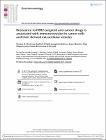| dc.contributor.author | O'Driscoll, Lorraine | |
| dc.contributor.author | Martinez, Vanesa G. | |
| dc.contributor.author | O'Neill, Sadhbh | |
| dc.contributor.author | Salimu, Josephine | |
| dc.contributor.author | Breslin, Susan | |
| dc.contributor.author | Clayton, Aled | |
| dc.contributor.author | Crown, John | |
| dc.date.accessioned | 2020-03-13T14:12:26Z | |
| dc.date.available | 2020-03-13T14:12:26Z | |
| dc.date.issued | 2017 | |
| dc.date.submitted | 2017 | en |
| dc.identifier.citation | Martinez, V.G., O'Neill, S., Salimu, J., Breslin, S., Clayton, A., Crown, J. & O'Driscoll, L., Resistance to HER2-targeted anti-cancer drugs is associated with immune evasion in cancer cells and their derived extracellular vesicles, Oncoimmunology, 6, 12, 2017, 530 - 540 | en |
| dc.identifier.issn | 2162-4011 | |
| dc.identifier.other | Y | |
| dc.identifier.uri | https://www.tandfonline.com/doi/full/10.1080/2162402X.2017.1362530 | |
| dc.identifier.uri | http://hdl.handle.net/2262/91792 | |
| dc.description | PUBLISHED | en |
| dc.description.abstract | Neuromedin U (NmU) -a neuropeptide belonging to the neuromedin family– plays a substantial role in HER2-positive breast cancer, correlating with increased aggressiveness, resistance to HER2-targeted therapies and overall significantly poorer outcome for patients. However, the mechanism through which it exerts these effects remains unclear. To elucidate this, initially we used HER2-positive breast cancer cells stably over-expressing NmU. These cells and their released extracellular vesicles (EVs) had increased amounts of the immunosuppressive cytokine TGFβ1 and the lymphocyte activation inhibitor PD-L1. Furthermore, these cells also showed enhanced resistance to antibody-dependent cell cytotoxicity (ADCC) mediated by trastuzumab, indicating a role of NmU in enhancing immune evasion. All these features were also found in HER2-targeted drug-resistant cells which we previously found to express higher levels of NmU than their drug-sensitive counterparts. Interestingly, EVs from drug-resistant cells were able to increase levels of TGFβ1 in drug-sensitive cells. In our neo-adjuvant clinical trial, TGFβ1 levels were significantly higher in EVs isolated from the serum of patients with HER2-overexpressing breast cancers who went on to not respond to HER2-targeted drug treatment, compared with those who experienced complete or partial response. Taken together, our results report a new mechanism-of-action for NmU in HER2-overexpressing breast cancer that enhances resistance to the anti-tumor immune response. Furthermore, EV levels of TGFβ1 correlating with patients' response versus resistance to HER2-targeted drugs suggests a potential use of EV-TGFβ1 as a minimally-invasive companion diagnostic for such treatment in breast cancer. | en |
| dc.format.extent | 530 | en |
| dc.format.extent | 540 | en |
| dc.language.iso | en | en |
| dc.relation.ispartofseries | Oncoimmunology; | |
| dc.relation.ispartofseries | 6; | |
| dc.relation.ispartofseries | 12; | |
| dc.rights | Y | en |
| dc.subject | Biomarker | en |
| dc.subject | Extracellular vesicles | en |
| dc.subject | Exosomes | en |
| dc.subject | Immune evasion | en |
| dc.subject | Neo-adjuvant clinical trial | en |
| dc.subject | Neuromedin U | en |
| dc.title | Resistance to HER2-targeted anti-cancer drugs is associated with immune evasion in cancer cells and their derived extracellular vesicles | en |
| dc.type | Journal Article | en |
| dc.type.supercollection | scholarly_publications | en |
| dc.type.supercollection | refereed_publications | en |
| dc.identifier.peoplefinderurl | http://people.tcd.ie/lodrisc | |
| dc.identifier.rssinternalid | 180475 | |
| dc.identifier.doi | 10.1080/2162402x.2017.1362530 | |
| dc.rights.ecaccessrights | openAccess | |
| dc.subject.TCDTheme | Cancer | en |
| dc.subject.TCDTag | BREAST CANCER | en |
| dc.identifier.orcid_id | 0000-0002-9860-8262 | |




